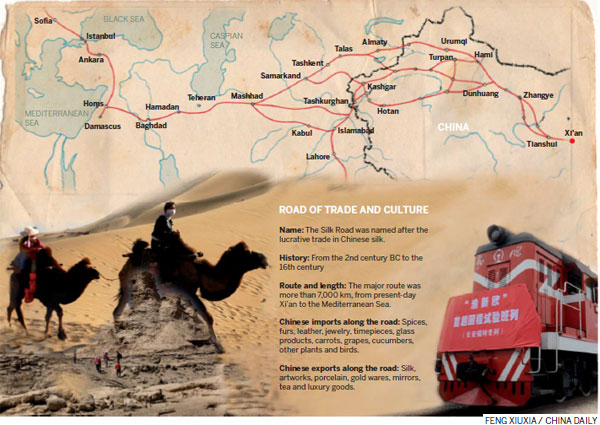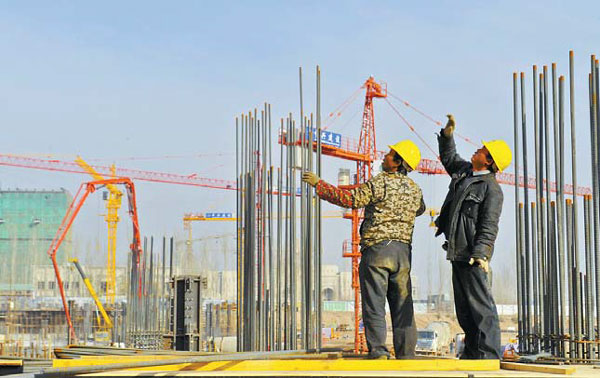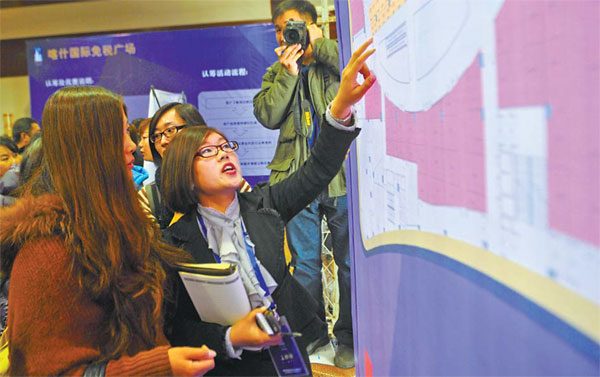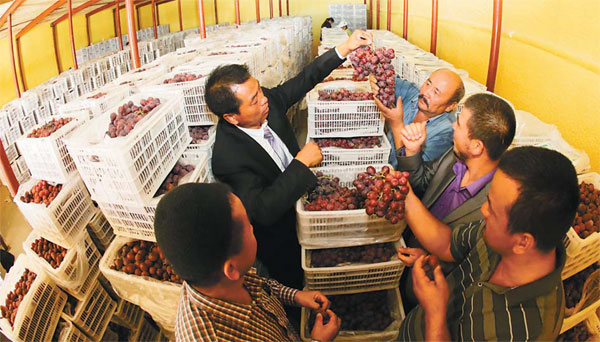Biz updates
Modern merchants follow famous footsteps
Updated: 2014-04-11By Cui Jia ( China Daily Africa )

|
A special economic zone under construction in Kashgar, Xinjiang Uygur autonomous region. Zhao Ge / Xinhua |
|
A guide explains the blueprint of a duty-free international plaza being built in Kashgar's special economic zone. Zhao Ge / Xinhua |
|
A container truck from Kazakhstan is loaded at a newly opened fruit and vegetable export center in Horgos, Xinjiang Uygur autonomous region. Li Xiongxin / For China Daily |
|
Merchants from Central Asia check grapes at the fruit and vegetable export center in Horgos. Li Xiongxin / For China Daily |
China has proposed a modern version of one of the ancient world's best-known trade routes
The Silk Road. The very name conjures up images of hardy, courageous merchants fighting off bandits and warring tribesmen as their caravans, carrying exotic silks and spices, ventured warily along a series of ancient trade routes that stretched more than 7,000 kilometers from China to the Mediterranean Sea and provided a connection between East and West for centuries.
Now, plans are afoot to bring back the glory days, but instead of camels, the modern travelers will use automobiles, trains and aircraft to traverse a route that was responsible for the settlement and development of some of the greatest cities known to the ancient world.
In 2013, during a speech in Kazakhstan, President Xi Jinping proposed that China and the Central Asian countries build an "economic belt along the Silk Road". The trans-Eurasian project would target more than 3 billion people and represent the single biggest market in the world, one with unparalleled potential.
In his work report at the start of the second session of the 12th National People's Congress, Premier Li Keqiang stated that the government will push forward the establishment of the Silk Road Economic Belt, which may eventually encompass more than 40 countries.
Sun Weidong, a consular official at the Chinese embassy in Kazakhstan, says the economic belt will mainly benefit China's underdeveloped western region and will become an updated version of the "Go West" strategy of the early years of this century. In addition, the government hopes that the project will open up western China to Eurasian countries and correct the developmental imbalance with the coastal regions in the east.
Fierce competition
While Sun admitted that a lack of policy support and detailed guidance from the central government will initially pose problems for the development of the project, he was adamant that cities on the proposed route will be in fierce competition to grab a piece of the pie.
Dong Jun, mayor of Xi'an, the capital of Shaanxi province, the original starting point of the ancient Silk Road, says the city is anxious to reclaim its position as a hub of trade and cultural communications.
"The corporations in the cities within the economic belt have great potential, and we can complement each other's economies," Dong says, adding that Xi'an plans to invite Central Asian countries to set up consulates in the city to deepen cooperation.
As with any venture of this kind, an efficient transport infrastructure will be at its heart. As such, Xi'an plans to launch direct flights to Astana, the capital of Kazakhstan, and Ashgabat, the capital of Turkmenistan, to promote the surveying and drilling equipment manufactured in the city to countries in central and western Asia, Dong says.
Tang Zongwei, deputy director of the administrative committee of Liangjiang New Zone in Chongqing, the only municipality in China's west, says: "The focus of the construction of the Silk Road Economic Belt relies heavily on transport connections."
Huang Qifan, the municipality's mayor, says, "Chongqing is one step ahead in taking the initiative in the economic belt." He pointed out that the municipality has been shipping goods to Europe via the trans-Eurasian railway network since 2011.
The Chongqing-Xinjiang-Europe international railw ay, which begins at Chongqing, bridges East and West and connects North and South. Trains on the network take just 14 to 15 days to get to Europe, 20 days fewer than the cargo ships that sail from China's east coast ports. That makes rail an ideal transport medium for goods with a relatively shorter shelf life, he says.
The railway passes through Xi'an, Lanzhou, Urumqi and the Alataw Pass, where it crosses the border into Kazakhstan. It then continues through Russia, Belarus and Poland before ending in Duisburg, Germany.
Chongqing has already started to seek cooperation with Russia, which is about to establish a consulate in the municipality. Direct flights to several Russian cities will begin this year, and a Sino-Russian industrial park will be built in Liangjiang New Zone that focuses on aviation-related manufacturing, such as helicopter parts and engines.






